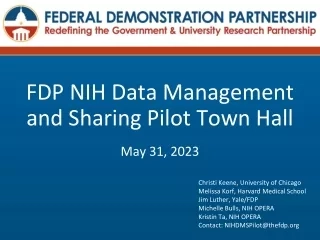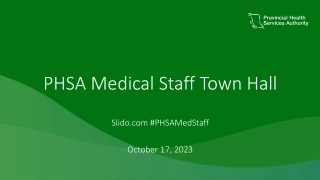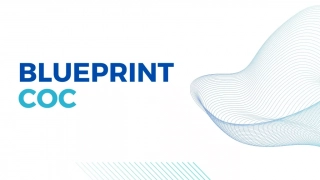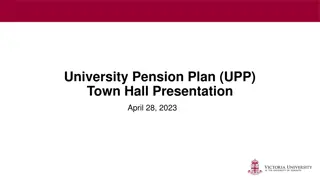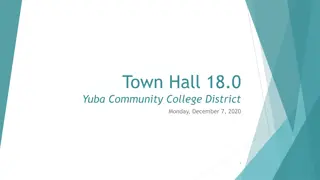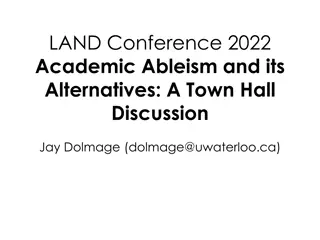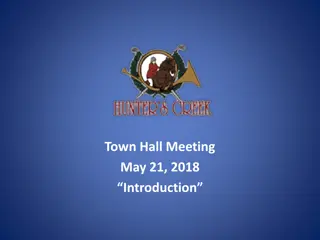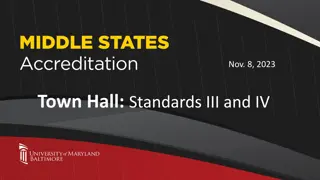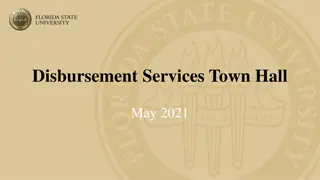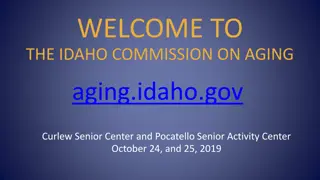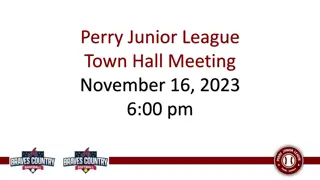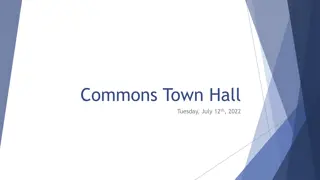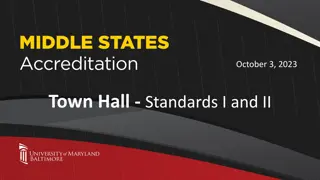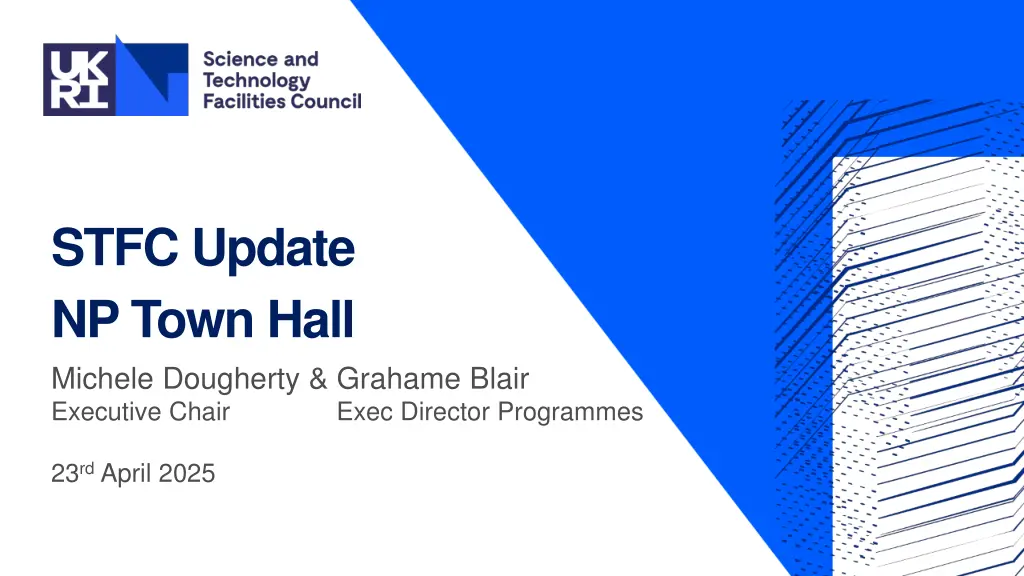
STFC Update: Michele Dougherty's Role as Executive Chair & Grahame Blair's Programmes Director
Stay informed with the latest on Michele Dougherty's appointment as Executive Chair of STFC and Grahame Blair as the Programs Director. Learn about their roles, accomplishments, and strategic engagements including with CERN. Keep up-to-date with UKRI's initiatives in infrastructure, space, and more.
Uploaded on | 7 Views
Download Presentation

Please find below an Image/Link to download the presentation.
The content on the website is provided AS IS for your information and personal use only. It may not be sold, licensed, or shared on other websites without obtaining consent from the author. If you encounter any issues during the download, it is possible that the publisher has removed the file from their server.
You are allowed to download the files provided on this website for personal or commercial use, subject to the condition that they are used lawfully. All files are the property of their respective owners.
The content on the website is provided AS IS for your information and personal use only. It may not be sold, licensed, or shared on other websites without obtaining consent from the author.
E N D
Presentation Transcript
STFC Update NP Town Hall Michele Dougherty & Grahame Blair Executive Chair Exec Director Programmes 23rd April 2025
UKRI Executive STFC Executive Chair In January, I started as STFC s Exec Chair Part of UKRI's Executive Committee UKRI s champion for Infrastructure and Space UK representative on CERN Council and SKAO Council I have a 35 yr career as a Space Physicist including: PI for Cassini (Saturn) and Jupiter Icy Moons Explorer (JUICE) In addition, I am Institute of Physics President-Elect and President from October 2025 Former roles include: Head of Department of Physics at Imperial College STFC Council member
First 3 months Since 02 January (my first day) Visit to CERN and my first CERN Council meeting Impressed by span of UK contributions critical contributions across breath of CERN activities Visit Jodrell Bank and my first SKAO Council meeting Strategic meetings with local Universities including Physics department updates University of Manchester University of Liverpool & Liverpool City Region Mayor University of Oxford Visit to Daresbury including the update on research into sustainable accelerators and LBNF-DUNE project
CERN: Strategy and Governance General updates: Michele Dougherty is the new UK CERN Council delegate alongside Shabana Haque (DSIT) Mark Thomson to become CERN DG in January 2026 STFC is preparing to engage with new CERN management Eight underground CERN visits delivered including DSIT Science, Innovation and Technology committee on 3rd March UK Strategy for Engagement with CERN 2025 activities include: Coordinating activities related to engineering and CERN across the UK Promoting CERN training opportunities to UK technical audiences (with CERN HR) Improving the value proposition for engaging UK industry in commercial opportunities Align CERN engagement to new government priorities and ambitions Landscape analysis of CERN-related outreach and public engagement in the UK Contact the STFC CERN team at: ukatcern@stfc.ukri.org
UKRI Executive CEO UKRI Prof Sir Ian Chapman will start as UKRI s CEO in August 2025 Ian is currently CEO of the UK Atomic Energy Authority (UKAEA) and a UKRI Board member He is distinguished physicist: Knight Bachelor in the New Year Honours List 2023 for his services to global fusion energy Fellow of the Royal Academy of Engineering and a Fellow of the Royal Society. His research has been recognised with a number of international awards Upon appointment, he said: Research and innovation must be central to the prosperity of our society and our economy, so we have the great privilege of shaping the future of the country.
STFC Executive Executive Director National Labs Large Scale Facilities Prof Roger Eccleston was appointed Executive Director with effect from 9 December 2024 He was formerly: Director of ISIS Neutron & Muon Source Deputy Vice-Chancellor (Academic) at Sheffield Hallam University Chief Operating Officer Keith Zimmerman has been appointed at COO and started 31 March He was formerly: Director of a transformation programme at King s College Chief Operating Officer at the University of Bath,
STFC Council Appointments New Council members This month, we welcomed 4 new Council members: Prof David Charlton, Poynting Professor of Physics at University of Birmingham. He is an experienced Particle Physicist and was previously on Science Board (PPAN) Prof Stan Bentvelsen, Professor at University of Amsterdam and former director of Nikhef. He is a scientific lead on Einstein Telescope (Gravitational Waves) Prof Jayne Lawrence, Director of University of Manchester @ Harwell. She is a long term user of STFC facilities and a former chair of Science Board Prof Andrew Pontzen, Professor of Cosmology Durham University. His research interests are the interfaces of astrophysics, high energy physics, cosmology and computation We would like to encourage more under-represented groups to apply to all of our advisory bodies and will be issuing calls for new members of Science Board and other boards and panels later this month
Spending Review Spending Review process in a nutshell Spending Reviews (SRs) are led by HM Treasury STFC and the other research councils feed priorities into UKRI, who submits a collective bid into DSIT, along with other public bodies, e.g. the Met Office DSIT makes its bid into HMT, which set the department budgets and the allocation process then flows in reverse This Spending Review is in 2-phases: Phase 1 budgets for 2025/26 Phase 2 budgets for 2026/27-2029/30
Spending Review Phase 1 Headlines for 2025/26 : DSIT has announced almost 14 billion of R&D funding, with 8.8 billion budget for UKRI We welcome the protection of R&D budgets, particularly as the government is having to make difficult choices to prioritise its spending in the face of more challenging time with constrained budgets across the public sector The case for research and innovation is strong given its central role in driving economic growth and improving productivity in the economy and public services As we enter a period of tighter budgets, UKRI is working collectively to ensure its portfolio as a whole is balanced to deliver the best outcomes now and in the future There are parts of the R&D system that will be disappointed that their ambitions have not been met
Spending Review Phase 1 Implications for STFC Funding in 2025/26: There are significant pressures and calls on STFC s budget: Inflation has been significant over recent years (over 10% p.a. at times), which has not been matched by increased funding for construction/lab infrastructure Salaries, University overheads and student stipends have all increased Delays (including Covid) and technical challenges have led to increased costs STFC has long-term international commitments backed by MoUs and agreements We have had to make some difficult choices to reach a balanced budget: Reduced % success rate for the 2024 Astronomy and Particle Physics grants rounds with priority given to preserving people, resulting to reductions in capital investments Some projects have not been renewed or are being paused We are committed to reducing STFC s fixed costs including operations national facilities at a reduced rate in 2025 and reducing staff numbers
Spending Review Phase 2 Status: Phase 2 is currently underway with an initial announcement expected this summer Recognising the tight fiscal position across the whole of the public sector, UKRI has submitted a realistic flat-real bid, focused on 3 priority areas: 17bn on new discoveries from curiosity driven research 10bn on scaling and growing innovation; and 9bn on citizen outcomes/public services However, flat-real will involve some hard choices about what to close, stop or scale back across the UKRI portfolio The impacts will be felt across all Research Councils and our communities
Spending Review Phase 2 We are committed to ensuring a sustainable future for our research communities We cannot continue with everything that we currently fund, but what we do fund must be at a viable level, delivering world class research and technology We are currently engaging our Science Boards and Council in a prioritisation exercise to assess the scientific impacts across all our portfolio: Joint meeting of STFC Council & Science Board in March 11 &15 April and 1 May extraordinary Science Board Prioritisation meetings 14 May Council Review This will feed into discussions with incoming UKRI CEO and DSIT The prioritisation builds upon the recent PPAN roadmap activity a big thank you to everyonein the community who has contributed to this extensive process
NP Programme Update
STFC Nuclear Physics NP Consolidated Grant Projects FAUST RIBF FAIR R3B Silicon Tracker Electron Ion Collider (EIC) UKRI Infrastructure Fund Subscriptions/M&O FAIR (NuSTAR and HISPECC/DESPEC) ISOLDE@ CERN MINIBALL EXOGAM AGATA ALICE ECT*
Nuclear Physics Consolidated Grants 2023 (October 2024 September 2027) - Exploitation from PD Core - ~ 19m The NP Consolidated Grants (CG) provides funding that underpins both the nuclear physics programme, including both experiment and theory in nuclear structure, hadronic physics and nuclear astrophysics. Measure 2020 2023 Who? 11 Institutes: University of Birmingham Sheffield Hallam University University of Edinburgh University of Glasgow University of Liverpool University of Derby STFC Daresbury Laboratory University of Manchester University of Surrey University of the West of Scotland University of York 8 8 11 29 Number of proposals Number of institutes Number of scientific themes 12 33 66 63 Academics Number (Requested) 6% 2.8 23 19 9 6.5 13 10 4.5% 2.9 34 25 12 9.4 13 11.8 Academics - Average FTE Academics Total FTE per year PDRA Number PDRA - Total FTE per year Core Posts Number Core Posts - Total FTE per year Cross Community - Number Cross Community - Total FTE per year 2 3 Number of Studentships Technician - Total FTE per year Total Number of FTE per year 3.9 44.3 5.2 54.3
Nuclear Physics CG 2026 Round STFC has moved to 4-year consolidated grants. This provides benefits to the community in terms of longer-term planning and commitment and is easier for the office to administer. The 2026 Nuclear Physics CG round will use the new Funding Service (TFS). New NP Panel members will be recruited in 2025 to support the consolidated grant round. In line with the awarding of the recent PP and Astronomy grants, it is anticipated that the 2026 NP CG will be constrained to a similar level reflecting the pressures on the research budget. The detail of this will be established through the on-going PPAN prioritisation exercise and outcome of the SR2. Rough Timeline: Autumn 2025 Call information published November 2025 Call Opens February 2026 Call Closes
Nuclear Physics Advisory Panel and Nuclear Physics Grant Panel Membership call Advisory Panel: Four new members with specific research interests Grant Panel: Six new members including a new Chair, expertise in hadronic physics, nuclear structure and theory. CCC: Three new members required. Please see the website for the main call s page: Call for applications to STFC advisory bodies and peer review panels UKRI Call opened in April 2025 and will close on 18 May 2025. This aligns with recruitment across other STFC panels. Any questions please speak to a member of the team.
Computing and e-Infrastructure DiRAC - DiRAC-4 science case has recently been externally peer reviewed. Resource Allocation Committee - peer review of RAC17 proposals is complete, computing allocations to start April 2025. RAC18 to be launched in due course. GridPP - funding constraints have meant restrictions on hardware procurement. We may fall below the UK pledge in future years but are working actively with the collaboration to mitigate where possible. SWIFT-HEP - supports software development for the HL-LHC era however it is not possible to support the second phase of the project going forward. AIRR (AI Research Resource) - 7.5m has been allocated from the UKRI DRI fund for the new AI Research Resource (Dawn) at Cambridge for operations from April 2024 - March 2028. Isambard-AI ( 243.5m) will also be coming online line in 2025. A call for expressions of interest to get access to AIRR is now open: https://engagementhub.ukri.org/ukri-infrastructure/airr-eoi/ New Computing Advisory Panel (CAP) - is being set up to replace the STFC e- Infrastructure Advisory Group (SEAG). The recruitment process is underway.
Quantum Technologies for Fundamental Physics (QTFP) A programme funded by the UKRI Strategic Priorities Fund (SPF), run jointly with EPSRC. Applies the latest advances in quantum science and technology to explore and answer long-standing research questions about the universe and its evolution. The first programme entailed: 32m for 7 large consortia over 5 years 6.3m for 17 small projects over 2 years Programme is currently bridged to Sept 2025 only, from STFC core funding. Awaiting outcome of SR Phase 2 for Quantum Technologies. If favourable a call for large consortia awards to start on 1 April 2026 will be issued. If no dedicated funding from SR phase 2 then, like all other programme areas, QTFP is under consideration within the prioritisation exercise.
Doctoral Studentships and Stipends Update UKRI has announced uplifts to the minimum PhD stipend level, (the latest increase from October 2025 is an increase by 8% to 20,780 per year) and has updated our terms and conditions in response to the New Deal work. STFC response STFC has maintained landscape (DTP) numbers for 2025 starts but given these increases and our overall financial position we may need to reassess our numbers going forwards. We are working with our ETCC advisory group to develop a new algorithm for landscape (DTP) students to allow the changes for astronomy grants to be incorporated and reduce bureaucracy
Fellowship Programmes The main fellowship programmes for STFC community are: Ernest Rutherford Fellowships (STFC): A large number of applications received (again) this year (168 applications). Panels took place at the end of March and interviews will take place at the end of April. Many thanks to colleagues for their help in peer review. UKRI Future Leaders Fellowship Round 9 applications received and sifted. Interviews will take place in May. Round 10 has opened with a closing date in June. Discussions are taking place on a more common fellowships framework across UKRI
Outlook The environment is currently uncertain on many levels but: The PPAN programme remains strong and world leading: Strong scientific leadership across the PPAN Area. Excellent community with high quality ECRs and students. We are well prepared to weather the current uncertainty Strengthened Science Boards now up and running for over a year. Over a year of background preparation in developing a prioritised Roadmap. Strong input from Advisory Panels as basis of up-to-date portfolio analysis. New planning tools in place based on a well-structured 10-year plan. Strong community participation in international activities, e.g. NuPECC 2024 LRP. Great opportunities for joint evolution of our programme, together with our international colleagues.

